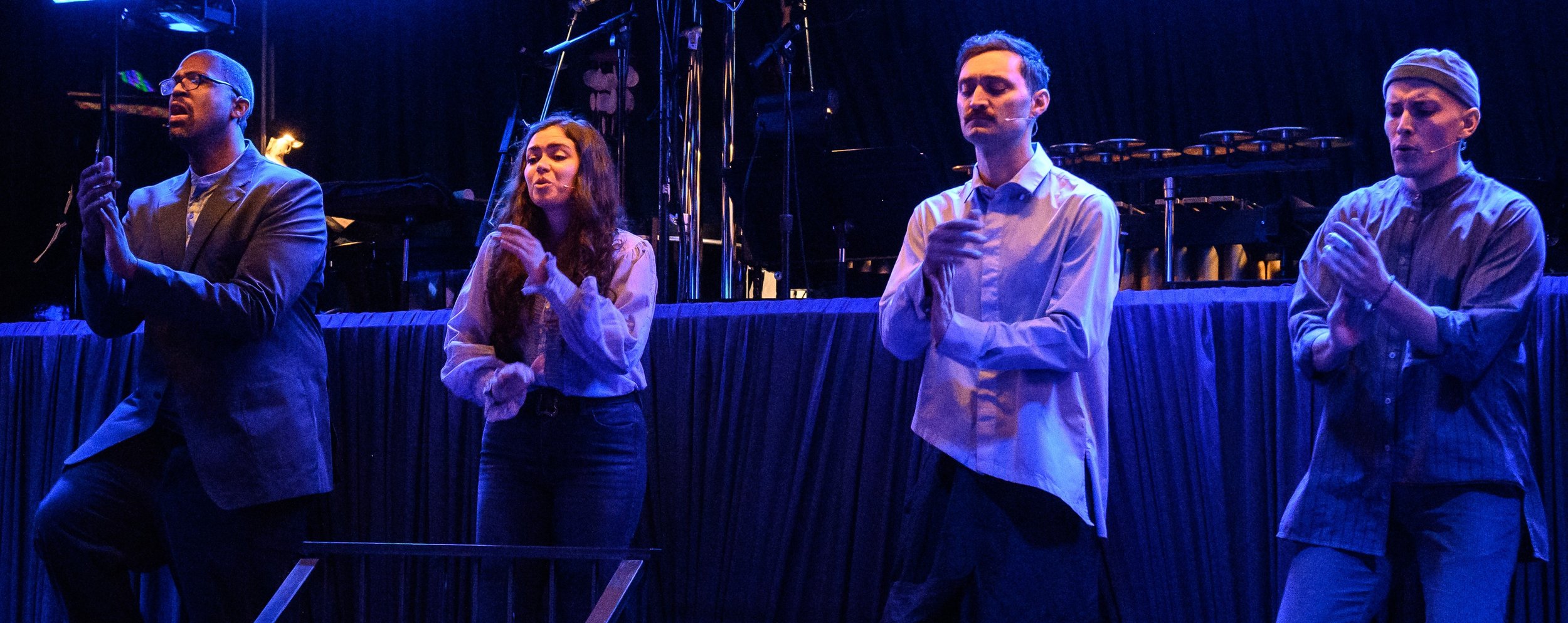Brian Flores and Ben Moss perform inches away from masked audience members on Kristen Robinson’s multilevel stage set for Oratorio for Living Things by Heather Christian.
Heather Christian’s Oratorio for Living Things was supposed to open on March 30, 2020. Two weeks before that, New York City’s playhouses closed precipitately in response to COVID-19. On the second anniversary of the aborted premiere, Oratorio has returned. After 24 months of isolation and loss, there’s a miraculous feel to this new music-theater piece.
Dito van Reigersberg (left) and Barrie Lobo McLain frolic on the tiny arena stage of Christian’s Oratorio for Living Things.
In scope and ambition, Oratorio is a monumental work; in running time (90 minutes without intermission), it’s concise. Composer-dramatist Christian says her aim is “to visit time on three scales: the quantum, the human, the cosmic.” Her inspiration comes from three 20th-century visionaries: German composer Carl Orff; the Cornell University astronomer Carl Sagan; and Italian theoretical physicist Carl Rovelli. Orff and Sagan are dead; Rovelli, at age 65, is going strong.
Act 1, “Time at the Quantum Scale,” includes reflections on photosynthesis, water, oxygen, carbon, and DNA. In a burst of mordant wit, Christian closes this section with the account of a single life in terms of activities repeated from cradle to grave: “Three and a half hours throwing away unopened mail / Forty minutes putting lids on Tupperware / Eighteen days looking for a bathroom / One year in the ‘Bag Drop’ line / Eleven days trying to remember why you came into the room / Four hours changing pants,” on and on and on.
Act 2 consists largely of recollections Christian received in emails solicited from anonymous correspondents. These random memories—some sweet, others silly, a few quite funny, and most mundane—coalesce as a mosaic of “time at the human scale.” This middle section is a melancholy foil to the grand, violent events coming next.
“The fine choral ensemble chronicles history from the Big Bang to the present in terms of a hypothetical one-year calendar.”
In the last act, Christian tackles “time at the cosmic scale” by examining “what is colliding and exploding.” Space, she cautions, “is an extremely violent place.” Time “cracks us down the center and / We won’t go back together.” On its surface, Christian’s text addresses cosmology; the subtext concerns human emotion. Her real focus, as the title indicates, is on “living things.” When the lyrics depict eruptions of Vesuvius (“Mountain emerging / Mountain dashed / Something ruined made you / Dust to dust / Ash to ash”), Christian is really pondering the magnitude of mortal suffering.
As a coda, Christian offers a “cosmic calendar” that puts humanity in its place. Under music director Ben Moss (also one of the performers), the fine choral ensemble chronicles history from the Big Bang to the present in terms of a hypothetical one-year calendar. There are 365 days in this account, but the period from the European Renaissance to the present occupies only the last seconds of the final hour of Dec. 31.
This production, vigorously directed by Lee Sunday Evans, is through-sung by a 12-member cast, accompanied by six instrumentalists (strings, reeds, keyboard, and percussion). The glorious score is jazzy, gospel-inflected, sometimes fugal, often seemingly liturgical, with hints that Christian’s musical imagination is influenced by Orff (especially his Carmina Burana). It’s hard to think of contemporary antecedents for this piece, yet at moments there are echoes of Elizabeth Swados, Meredith Monk, and Philip Glass.
Quentin Oliver Lee, Ashley Pérez Flanagan, Sean Donovan, and Brian Flores are bathed in the moody hues of Jeanette Oi-Suk Yew’s lighting design for the Ars Nova production of Oratorio for Living Things. Photographs by Ben Arons.
Scenic designer Kristen Robinson has reduced the already small Greenwich House theater to a gemütlich arena with 110 seats on steep risers. The risers surround a minuscule playing space, and they’re hung with dark fabric that softens the atmosphere of the auditorium, creating a womb-like effect. Four sets of steep steps serve as access to audience seating and auxiliary playing spaces for the performers. In this environment, the spectator feels connected—inordinately connected—to the performers, as well as to fellow audience members.
The cast is strong in musicianship and stage presence. The score and text would justify an unadorned concert presentation. But Evans and the designers (lighting designer Jeanette Oi-Suk Yew and costumer Márion Talán de la Rosa, as well as Robinson) contribute immense visual appeal.
For Christian, theater is a sacral realm. She’s reflecting on things spiritual and cosmic, just as Joseph Haydn did in The Creation, the beloved oratorio in which “the Heavens are telling the glory of God.” Unlike Haydn, Christian doesn’t need a deity to find sacred elements in the universe or in humanity. As Simone Weil puts it in the quotation Christian has chosen as an epigraph: “Time’s violence rends the soul; by the rent, eternity enters.”
Ars Nova’s production of Oratorio for Living Things runs at Greenwich House (27 Barrow St., Manhattan) through May 15. Evening performances are Tuesday to Saturday at 7 p.m.; matinees are Saturday and Sunday at 2 p.m. For tickets and information, visit arsnovanyc.com. Turn-backs for sold-out performances are allocated via an in-person standby line forming at Greenwich House two hours before curtain time.





